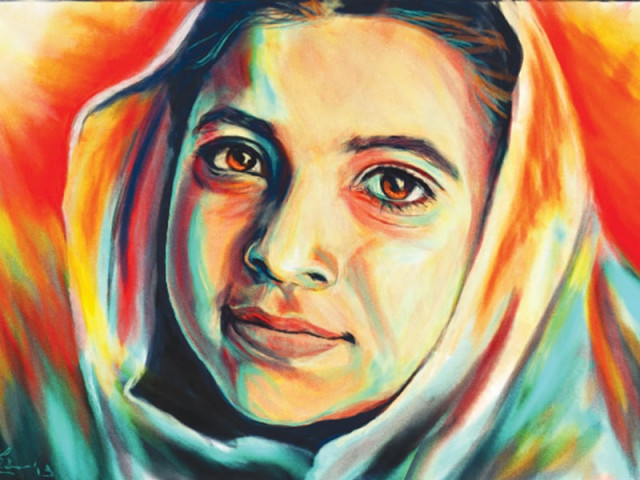In Swat, schoolgirls pray for Malala's Nobel in secret
Many regard her with suspicion and even contempt in her home town.

Malala Yousufzai. PHOTO: OMAR GILANI
Malala, who survived being shot by the Taliban on October 9 last year, has become a global ambassador for education, feted by celebrities and politicians around the Western world.
But in Swat valley, many regard her with suspicion and even contempt.
Her longtime friend Safia has no such doubts. Peeling off from a group of girls at a high school in Mingora, the main town in Swat, she spoke confidently about her friend, and women's rights, in excellent English.
Malala is among the favourites for the Nobel, which will be awarded on Friday, and Safia said she deserves it. She supports Malala's efforts to get all children - girls as well as boys - to go to school.
"A bicycle cannot run with only one wheel: society is like a bicycle, with the male education as the first wheel and female education as the second one," she told AFP.
Beautiful, verdant Swat was once a honeypot for tourists, but it was plunged into war in 2007 when the Tehreek-e-Taliban Pakistan (TTP) took control and enforced a hardline rule until they were kicked out by the army two years later.
But pockets of militancy remain and a year ago a TTP hit squad shot Malala in the head at point-blank range on her school bus.
Remarkably, Malala survived and has spent the past year in England - first for treatment and then to continue her education.
Safia's sentiments are shared by many schoolgirls in Mingora, who want their country and their area to be known for something other than Taliban and bombs.
"Malala is a model, not only for us but for the whole Pakistan," said 14-year-old Rehana Noor Bacha.
Education has improved in Swat since the Taliban days. Since 2011 the proportion of girls going to school has risen to nearly 50 percent, from 34 percent, while that of boys is close to 90 percent.
But the authorities say they are short of at least a thousand female teachers and 200 classrooms for girls.
Malala has become one of the most famous teenagers in the world, attracting support from the likes of Madonna, Angelina Jolie, Hillary Clinton, Bono and Gordon Brown.
But this rise to stardom in the West, and her frequent appearances in the media, have brewed suspicion in the society.
The head of girls' education in Swat, Dilshad Begum, explained that in Pashtun society "people don't like to see women in front of cameras".
Maulana Gul Naseeb, a prominent figure in the JUI-F, was more forthright.
"America created Malala in order to promote their own culture of nudity and to defame Pakistan around the world," he told AFP.
Bizarre theories like this have gained ground on social networking sites, with users declaring themselves shocked to see the West elevate a girl "only" wounded while forgetting Afghan and Pakistani children killed by American bombs.
Driver Ali Rehman, 33, is among the sceptics.
"Local people never took her seriously. She became famous only because of international media," he told AFP, adding that nothing had changed except for Malala and her family who now have an easy life in the UK.
Malala first rose to prominence during Taliban rule in Swat with a blog for the BBC Urdu service chronicling the rigours of daily life under the TTP.
Safia said even people from Malala's village had opposed her, but that the critics were "hypocrites and jealous".
The threat of the TTP returning and the ubiquitous presence of the army which is now grudgingly returning control to the civilian authorities weigh heavily on the atmosphere in Swat.
After the attack on Malala, the students of Mingora's girls' school objected when the government tried to name it after her, saying they were afraid of attacks.
Even now, Dilshad Begum is reluctant to talk about Malala in public.
"I feel fear and I don't speak of her. People are silent about Malala even though they like her. Fear is still there somehow, despite optimism," she said.
Safia says she is optimistic and determined, and is doing better after spending three months feeling traumatised by the attack.
This week as the Nobel announcement approaches she will pray for Malala's chances, but warns it will make little difference if she wins.
"It will take at least three generations to make things change here," she sighed.













COMMENTS
Comments are moderated and generally will be posted if they are on-topic and not abusive.
For more information, please see our Comments FAQ